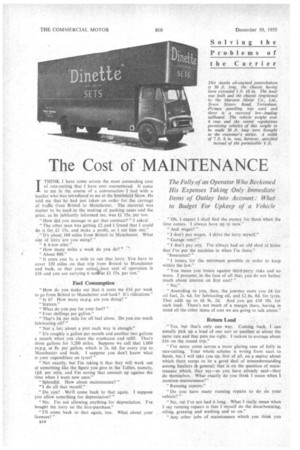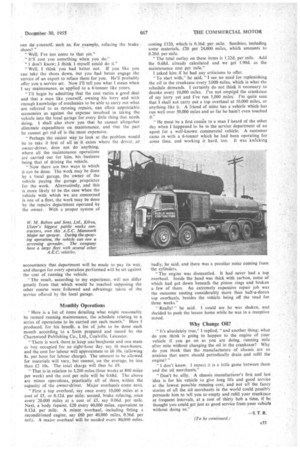The Cost of MAINTENANCE
Page 48

Page 51

If you've noticed an error in this article please click here to report it so we can fix it.
ITHINK I have come across the most astounding case of rate-cutting that I have ever encountered. It came to me in the course of a conversation I had with a haulier who was introduced to me at the Smithfield Show. He told the that he had just taken an order for .,the carriage of traffic from Bristol to Manchester. The material was timber to be usecI in the' making of packing cases and the price, as he jubilantly informed me, was El 15s. per ton.
.."
How -did you manage to get that contract? " I asked."The other man was getting £2. and I found that I could do, .i.t for ,i1 • 15s. and make a profit, so I cut him out." .,` It's about 160 miles from Bristol to Manchester, What size of .lorry are you using?"
"A 6-ton oiler." .
"How many miles a week do you do?"
"About 800."
"it costs you Is. a mile to run that lorry. You have to cover 320 miles on that trip from Bristol' to Manchester and back, so that your actual,,, bare cost • of operation is £16 and you are carrying 6 torffl at El 15s. per ton."
Fuel Consumption
"How do you make out that it costs me £16 per week to go from Bristol to Manchester and back? It's ridiculous." " Es it? How many m.p.g. are you doing? "
" Sixteen."
"What do you pay for your fuel? "
"Four shillings per gallon."
"That's 3d. per mile for 'oil fuel alone. Do you use much lubricating oil?"
" Not a lot; about a pint each way is enough."
"It's roughly a gallon per month and another two gallons a month when you clean the crankcase and refill. That's three gallons for 3,200 miles. Suppose we call that 1,000 m.p.g. at 8s. per gallon, which is 2s. 6d. for every trip to Manchester and back. I suppose you don't know what is your expenditure on tyres?"
"Not exactly, but l'rn taking it that they will work out at something like the figure you give in the Tables, namely, lid. per mile, and I'm saving that amount up against the time. when I want new ones."
"Splendid. How about maintenance?"
""I do all that myself."
"Do you? Well come backto that again. I suppose you allow something for depreciation?"
"No. I'm not allowing anything for depreciation. I've bought the lorry on the hire-purchase."
"I'll come back to that again, too. What about your licences? "
B14 "Oh, I expect I shall find the money for them when the time comes. "I always have up to now."
"And wages?"
"I. don't pay wages. I drive the lorry myself."
"Garage rent?"
"1 don't pay any. I've always had an old shed at home that I've put the machine in when I'm there."
"Insurance.?"
"1 insure_ for the minimum possible in order to keep . within the law."
" You mean you insure against third-party risks and no more. I presume, in the face of all that, you do not bother much about interest on first cost? "
No."
" According to you, then, the journey costs you £4 for oil fuel, 2s. 6d. for lubricating oil, and £2 6s. 8d. for tyres. That adds up to E6 9s. 2d. And you get f10 10s. for each load. There's not much of a margin there, having in mind all the other items of cost we are going to talk about."
Return Load
"Yes, but that's only one way. Coming back, I can usually pick up a load of one sort or another at about the same rate and that puts me right. I reckon to average about 116 on the round trip.'
"I've neve' come across a more glaring case of folly in rate-cutting. Your whole scheme is wrong from start to finish, but I will take you up, first of all, on a rnatter about which there seerus to be a good deal of misunderstanding among hauliers in general; that is on the question of maintenance which, they say—as you have already, said—they do themselves. What exactly do you think I mean when I mention maintenance?"
" Running repairs."
"Do you have many running repairs to do on your vehicle?"
"No, out I've not had it long. What I really mean when I say running repairs is that I myself do the decarbonizing, oiling, greasing and washing arid so on."
"Any other jobs of maintenance which you think you can ciO yourself, such as, for example, refacing the brake shoes? "
"Well, I've not come to that yet."
," It'll cost you something when you do."
I don't know; I think I myself could do it."
"Well, I think you had better not. If you like you can take the shoes down, but you had better engage the service of an expert to reface them for you. He'll probably offer you a service set. Now I'll tell you what I mean when I say maintenance, as applied to a 6-tonner like yours.
"I'll begin by admitting that the cost varies a good deal and that a man like yourself, owning his lorry and with enough knowledge of mechanics to be able to carry out what are referred to as running repairs, can effect appreciable economies as against the expense involved in taking the vehicle into the local garage for every little thing that needs doing. I shall also show you that he cannot altogether eliminate expenditure on maintenance, and that the part he cannot get rid of is the most expensive.
"Perhaps the easiest way to look at the problem would be to take it first of all as it exists where the driver, pr owner-driver, does not do anything, where all the maintenance operations are carried out for him, his business being that of driving the vehicle.
"Now there are two ways in which it can be done. The work may be done by a local garage, the owner of the vehicle paying the garage proprietor for the work. Alternatively, and this is more likely to be the case when the vehicle with which we are concerned is one of a fleet, the work may he done by the repairs department operated by the owner. With a proper system of accountancy that department will be made to pay its way, and charges for every operation performed will be set against the cost of running the vehicle.
"The result, according to my experience, will not differ greatly from that which would be reached supposing the other course were followed and advantage taken of the service offered by the local garage.
Monthly Operations "Here is a list of items detailing what might reasonably be termed running maintenance, the schedule relating to a series of operations to be carried out each month." Here I produced, for his benefit, a list of jobs to be done each month .according to a form prepared and issued by the Charnwood Publishing Co., Ltd, Coalville, Leicester.
"There is work there to keep one !rnechanic and one mate or boy occupied for an eight-hour day, say 16 man-hours, and the cost for labour will approximate to £6 10s. (allowing 8s. per hour for labour charge). The amount to be allowed for materials will vary, but cannot, on the average, be less than £2 10s. The total charge will thus be 19.
"That is in relation to 3,200 miles (four weeks at 800 miles per week) and the cost per mile will be 0.68d. The above are minor operations, practically all of them, within the capacity of the owner-driver. Major overhauls come next. First a top overhaul, say once every 10,000 miles at a cost of £5, or 0.12d. per mile: second, brake, refacing, once every' 20,000 miles at a cost of £5, say 0.06d. per mile. Next, a body repaint, £20 every 40,000 miles, equivalent to 0.12d. per mile. A minor overhaul, including fitting a reconditioned engine. say £60 per 40,000 miles, 0.36d. per mil:. A major overhaul will be needed every 80,000 miles. costing £120, whictris 0.36d. per mile.. Sundries, including some materials, £20 per 24,000 miles, which amounts to 0.20d. per mile.
" The total outlay on these items is 1.22d. per mile. Add the 0.68d. already calculated and we get 1.90d. as the maintenance cost per mile." I asked him if he had any criticisms to offer.
"To start with," he said, "1 see no need for replenishing the oil in the crankcase every 3,000 miles, which is what the schedule demands. I certainly do not think it necessary to decoke every 10,000 miles. I've not emptted the crankcase of my lorry yet and I've run 5,000 miles. I'm quite sure that I shall not carry out a top overhaul at 10,000 miles, or anything like it. A friend of mine has a vehicle which has run well over 50,000 miles and so far he hasn't even touched it."
" He must be a first cousin to a man I heard of the other clay when I happened to be in the service department of an agent for a well-known commercial vehicle. A. customer came in with a 6-tonner which he had been operating for some time, and working it hard, too. It was knikking
badly, he said, and there was a peculiar noise coming from -the cylinders.
" The engine was dismantled. It had never had a top overhaul. Inside the head was thick with carbon, some of which had got down :beneath the piston rings and broken a few of them. An extremely expensive repair job was the outcome costing considerably more than half-a-di:wen top overhauls, besides the vehicle being off the road for three weeks."
"
Really'!" he said. I could see he was shaken, and decided to push the lesson home while he was in a receptive mood.
Why Change Oil?
" It's absolutely true," I replied, "and another thing; what do you think is going to happen to the engine of your vehicle if you go on as you are doing, running mile after mile without changing the oil in the crankcase? Why do you think that the manufacturers of chassis are so anxious that users should periodically drain and refill the engine? "
I don't know. I expect it is a little game between them and the oil merchants."
" Don't be, silly. A chassis manufacturer's first and last idea is for his vehicle to give long life and good service at the lowest possible running cost, and not all the fancy stories of all the oil merchants in the world could possibly persuade him to tell you to empty and refill your erankase at frequent intervals, at a cost of thirty bob a time, if he thought you -could get just as good service from your vehicle without doing so."




















































































